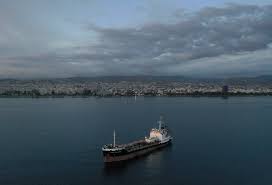All you need to know about the Red Sea crisis involving Yemen's Houthi
By Lokmat English Desk | Published: December 20, 2023 12:25 PM2023-12-20T12:25:06+5:302023-12-20T12:25:10+5:30
Yemen’s Iran-backed Houthi rebels are stepping up their strikes on ships in the Red Sea, which they say are ...

All you need to know about the Red Sea crisis involving Yemen's Houthi
Yemen’s Iran-backed Houthi rebels are stepping up their strikes on ships in the Red Sea, which they say are revenge against Israel for its military campaign in Gaza. The attacks have forced some of the world’s biggest shipping and oil companies to suspend transit through one of the world’s most important maritime trade routes, which could potentially cause a shock to the global economy. The Houthis are believed to have been armed and trained by Iran, and there are fears that their attacks could escalate Israel’s war against Hamas into a wider regional conflict. Since the outbreak of the war in Gaza, the Houthis have declared their support for the Palestinian cause and began attacking all ships that they believed were stopping at Israeli ports, causing insurance prices on ships passing through the Red Sea to rise dramatically and severely disrupting international trade.
Who are the Houthis?
The Houthi movement, also known as Ansarallah (Supporters of God), is one side of the Yemeni civil war that has raged for nearly a decade. It emerged in the 1990s, when its leader, Hussein al-Houthi, launched “Believing Youth,” a religious revival movement for a centuries-old subsect of Shia Islam called Zaidism.The Zaidis ruled Yemen for centuries but were marginalized under the Sunni regime that came to power after the 1962 civil war. Al-Houthi’s movement was founded to represent Zaidis and resist radical Sunnism, particularly Wahhabi ideas from Saudi Arabia. His closest followers became known as Houthis.Their power grew during the Yemen war which began in late 2014, when they seized Sanaa. Worried by the growing influence of Shi'ite Iran along its border, Saudi Arabia intervened at the head of a Western-backed coalition in 2015 in support of the Yemeni government. The Houthis established control over much of the north and other big population centres, while the internationally recognised government based itself in Aden.
Why are the Houthis attacking ships in the Red Sea?
The Houthi movement said this week that its "naval operations" were being carried out "to support the Palestinian people in confronting the aggression and siege on Gaza." A spokesman added in a social media post that the rebel group did not intend the Red Sea attacks as "a show of force nor a challenge to anyone."The Houthi rebels, who have a significant supply of ballistic missiles and Iranian-made attack drones, claim to be targeting ships belonging to Israel or the country's Western allies. U.S. warships in the region have shot down a growing number of attack drones launched from Yemen in recent days — including more than a dozen taken down on Dec. 16 alone. Some vessels have been hit, but many of the rockets and drones launched from Yemen never reach their intended targets, and it's often not clear what those targets actually were before the weapons are destroyed.
What is Operation Prosperity Guardian?
Defense Secretary Lloyd Austin on Tuesday said the United States was leading a multinational operation to safeguard commerce in the Red Sea as attacks by Iran-backed Yemeni Houthi militants forced more major shipping companies to reroute. The Houthis have stepped up the missile and drone attacks they began last month against international vessels sailing through the Red Sea, in response to Israel’s assault on the Gaza Strip. The attacks this week forced oil major BP and a slew of freight firms including Maersk to divert shipments normally made through the Suez Canal around the Cape of Good Hope, adding days to journey times and incurring higher costs. Israel’s 10-week-old war with Hamas, the Palestinian group that controls Gaza, has drawn in the United States and its allies on the side of Israel, and Iran and its Arab proxy forces on the side of Hamas, risking a wider regional conflict. Austin, who is on a trip to Bahrain, home to the U.S. Navy’s headquarters in the Middle East, said the United Kingdom, Bahrain, Canada, France, Italy, Netherlands, Norway, Seychelles and Spain were among nations involved in the Red Sea security operation. The group will conduct joint patrols in the southern Red Sea and the Gulf of Aden. “This is an international challenge that demands collective action,” Austin said in a statement, announcing the initiative as “Operation Prosperity Guardian”. In a virtual meeting with ministers from more than 40 nations, Austin called on other countries to contribute as he condemned “reckless Houthi actions.” Austin’s announcement however leaves many questions unanswered, including how many other countries are willing to do what mostly U.S. warships have done in recent days — shoot down Houthi missiles and drones, and rush to the aid of commercial ships under attack.
Open in app